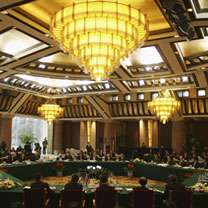Asia-Pacific
N. Korea invites IAEA chief to visit
(Agencies)
Updated: 2007-02-24 09:33
 |
Large Medium Small |
Vienna - North Korea on Friday asked the chief UN atomic inspector to visit four years after expelling his experts and dropping out of the Nuclear Nonproliferation Treaty -- an encouraging sign the country is serious about dismantling its weapons program.
Mohamed ElBaradei, the head of the International Atomic Energy Agency, offered few details about his upcoming trip, which other agency officials said would likely occur in the second week of March.
Still, his announcement was significant because it signaled the North's willingness to subject its nuclear program to outside scrutiny for the first time since withdrawing from the Nonproliferation Treaty in January 2003, just weeks after ordering nuclear inspectors to leave.
UN Secretary-General Ban Ki-moon hailed the invitation, which came five months after the North conducted its first nuclear weapon test, as a "good beginning," an interpretation shared by the US administration.
"We are really very pleased that the IAEA is now receiving the initial steps to be able to go back into North Korea to be able to verify compliance. It is indeed a good sign that it has happened as quickly as it has," Secretary of State Condoleezza Rice said in Ottawa, Canada.
White House spokesman Tony Fratto said the invitation shows North Korea is willing to begin executing the terms of the six-nation deal reached Feb. 13 in which the North said it would dismantle its nuclear facilities and normalize relations with South Korea, Japan and the US in exchange for oil shipments and security guarantees.
"We'll be interested in hearing his report when he gets back," Fratto said.
ElBaradei's trip will mark only an initial step in the long and complex process that the international community hopes will result in stripping the North of its nuclear weapons capabilities and ensuring it remains without such arms.
In a process that one UN official said "could take years," IAEA inspectors would be tasked with re-establishing the monitoring of the plutonium-producing Yongbyon nuclear facility, and then being on site while it is closed and dismantled.
"At the same time, there has to be some kind of declaration of what North Korea has and some way of following that up," the official said on condition of anonymity because the information was confidential.
Little is know about the North's nuclear program, leaving the outside world to rely mostly on North Korean claims since IAEA inspectors left in December 2002.
Conservatives in Washington have berated the Bush administration for caving in on its previous tough stance against the North. The US agreed to resolve financial restrictions it placed on a Macao bank, accused of complicity in counterfeiting and money laundering by North Korea, to pave the way for the disarmament-for-aid deal.
On Friday during a visit to Australia, US Vice President Dick Cheney expressed caution about the agreement, but called it a "first hopeful step."
"We go into this deal with our eyes open," Cheney said. "In light of North Korea's missile test last July, its nuclear test in October and its record of proliferation and human rights abuses, the regime in Pyongyang has much to prove."
The Feb. 13 agreement signed by the two Koreas, the United States, Japan, China and Russia specifies only that IAEA inspectors should be tasked with supervising the closing of the Yongbyon reactor. But former UN nuclear inspector David Albright, who last month visited North Korea, said officials there told him they wanted the agency's role expanded to "verify nuclear disarmament."
"They see the IAEA as the natural organization to verify whatever is done," said Albright, whose Washington-based Institute for Science and International Security tracks the North Korean and Iranian nuclear programs.
ElBaradei said he and North Korean authorities would meet on how to "implement the freeze of (nuclear) facilities" and the "eventual dismantlement of these facilities."
"I hope eventually they'll come back to be members of the IAEA," he said of the North, which left at the same time it quit the Nonproliferation Treaty.
Ban, who was visiting UN agencies in Vienna, said he hoped the ElBaradei invitation would translate into concrete steps in denuclearizing the Korean peninsula.
"I hope that he and his delegation will be able to discuss with North Korean authorities ... methods on first freezing nuclear facilities and including the eventual dismantlement of all nuclear weapons and facilities," Ban said.
Expressing his disappointment about Iran's nuclear defiance, Tehran continues to enrich uranium in violation of the UN Security Council, Ban said: "I hope sincerely that Iranian authorities should learn from the North Korean issue."
The Feb. 13 deal requires North Korea to first shut down and seal its main nuclear reactor within 60 days of the agreement, accept international monitors and begin discussions with the US on its other nuclear facilities. In return, the nations would ship the North an initial load of fuel oil.
If North Korea declares all its nuclear programs and begins to disable its nuclear facilities, it would get a much larger shipment of fuel oil and aid. The US also would begin the process of removing North Korea from its designation as a terror-sponsoring state and ending trade sanctions.
| 分享按钮 |

